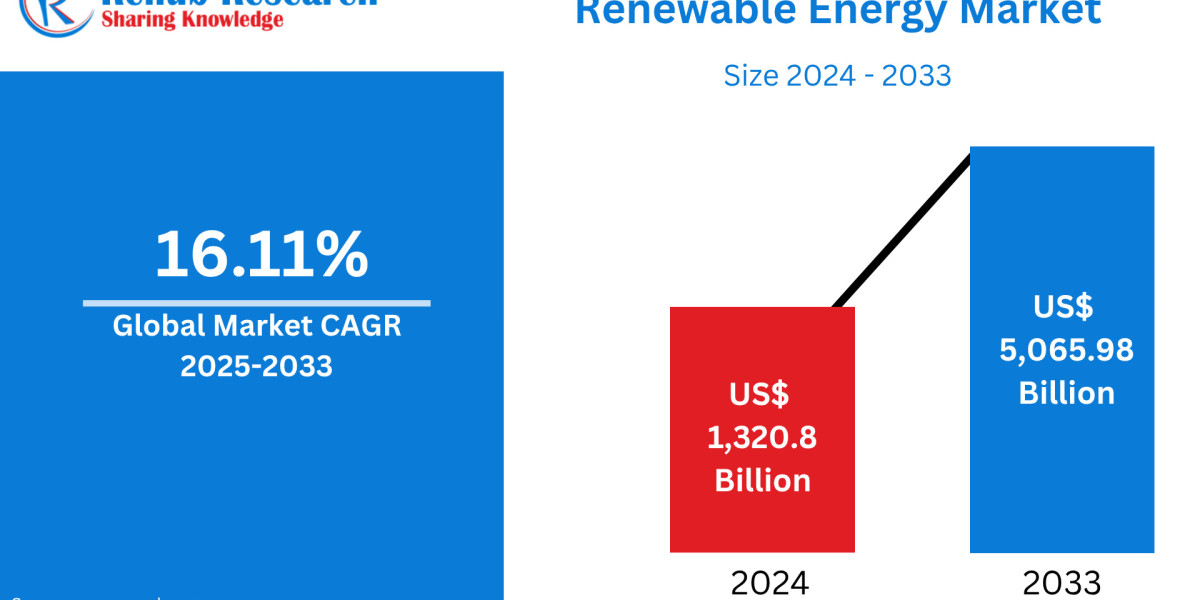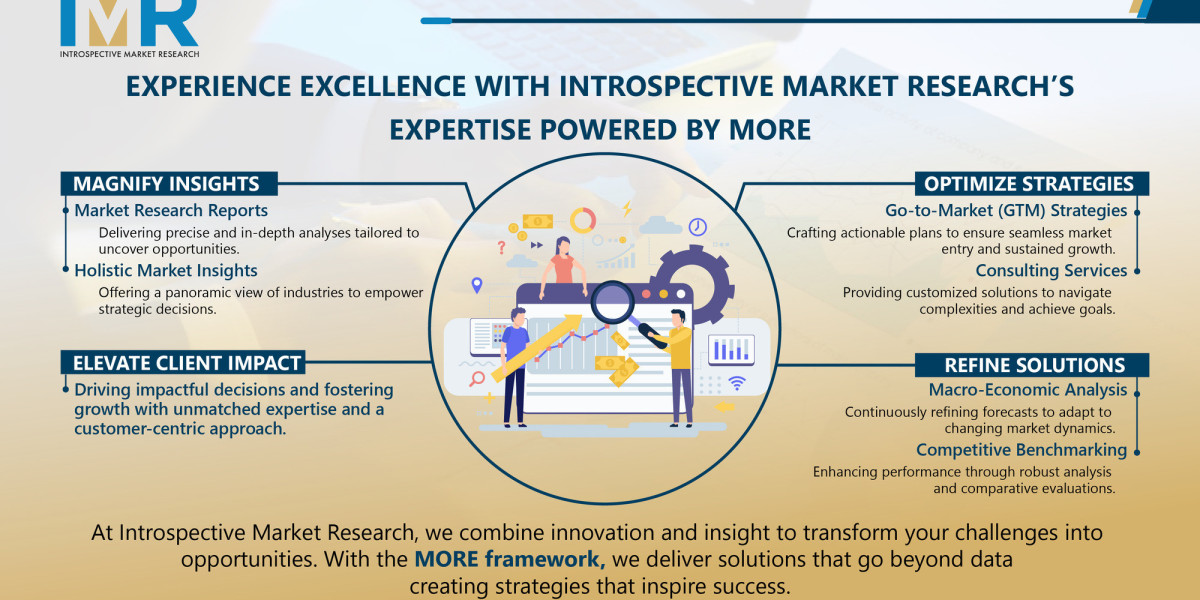Policy Support, Innovation, and Green Investments Powering Renewable Energy Expansion
According to Renub Research, the Global Renewable Energy Market is poised for transformative growth in the coming years, driven by climate imperatives, supportive government policies, declining technology costs, and rising global energy demand. As the world shifts toward sustainability, renewables like solar, wind, hydro, bioenergy, and geothermal are gaining rapid traction across developed and emerging economies alike.
Explore Full Report: Renewable Energy Market
Transitioning to a Sustainable Energy Future
Renewable energy is at the forefront of the global transition toward a cleaner, more resilient, and decentralized energy future. Amid growing concerns over fossil fuel dependency, greenhouse gas emissions, and geopolitical instability in oil-producing regions, governments and private players alike are investing heavily in renewable energy projects.
Solar and wind, in particular, have become mainstream technologies in global electricity generation, offering scalability, cost-efficiency, and zero emissions. Hydropower continues to serve as a stable base-load option, while bioenergy and geothermal are increasingly being integrated into national energy portfolios.
Government Policies and International Commitments Drive Market Momentum
The renewable energy market is receiving a major boost from international climate agreements, such as the Paris Accord, and net-zero targets set by leading economies. These commitments have prompted a wave of policy reforms, subsidies, tax incentives, and renewable portfolio standards (RPS) to facilitate clean energy deployment.
For instance:
· The European Union aims to source at least 42.5% of its energy from renewables by 2030.
· India has committed to reaching 500 GW of non-fossil fuel capacity by 2030.
· The United States Inflation Reduction Act has earmarked hundreds of billions of dollars in clean energy investments.
Such efforts are leading to aggressive development of solar parks, offshore wind farms, green hydrogen infrastructure, and grid modernization initiatives.
Technological Innovation Accelerates Adoption
Rapid advancements in renewable energy technologies are significantly lowering costs and increasing efficiency. Over the last decade, the levelized cost of electricity (LCOE) from solar photovoltaic (PV) and onshore wind has declined by over 80%, making them competitive or cheaper than fossil fuels in many regions.
Innovations such as:
· Bifacial solar panels
· Floating solar farms
· High-capacity energy storage (e.g., lithium-ion and flow batteries)
· Next-gen wind turbines with larger rotor diameters
· AI and IoT-enabled smart grids
are enabling renewable systems to achieve higher reliability, grid stability, and load balancing—addressing traditional challenges such as intermittency and transmission losses.
Solar and Wind Lead the Charge
Among all renewable sources, solar and wind energy remain the dominant forces in market growth. Their modular design, short construction timelines, and declining costs make them highly attractive for both utility-scale and distributed applications.
· Solar PV: Rooftop and utility-scale solar installations are proliferating in countries like China, India, the U.S., Australia, and Brazil. Innovations in perovskite cells, storage integration, and hybrid solar systems are expanding use cases beyond electricity to include desalination, cooling, and industrial heating.
· Wind Power: Both onshore and offshore wind projects are scaling rapidly, particularly in regions with strong policy backing such as the North Sea, China’s coastal provinces, and parts of the U.S. Offshore wind is expected to witness explosive growth due to larger capacity turbines and floating wind platforms.
Energy Storage and Grid Integration: The Next Frontier
As renewable energy penetration increases, grid stability and energy storage have become critical to managing supply and demand. Battery energy storage systems (BESS), pumped hydro storage, and hydrogen-based storage solutions are being deployed at scale to smooth out fluctuations.
Smart grids, equipped with AI algorithms and real-time analytics, are optimizing power flow, managing peak loads, and integrating distributed energy resources (DERs). These developments are essential to achieving a seamless and efficient transition to a renewable-dominant energy mix.
Green Hydrogen: An Emerging Opportunity
Green hydrogen, produced using renewable electricity through water electrolysis, is emerging as a key enabler of decarbonization across hard-to-abate sectors like steel, cement, chemicals, and aviation. Countries like Germany, Japan, India, and the Gulf States are investing in green hydrogen hubs to gain first-mover advantages in this transformative technology.
Massive electrolyzer projects and international hydrogen corridors are expected to create a multi-trillion-dollar green hydrogen economy over the next two decades.
Emerging Markets and Distributed Energy Unlocking New Growth
While developed nations are leading in renewable capacity additions, emerging economies in Asia, Africa, and Latin America are also witnessing rapid adoption, driven by electrification needs, energy poverty alleviation, and economic development.
Off-grid and distributed renewable energy solutions such as mini-grids and solar home systems are bringing electricity access to remote communities, transforming lives, and fueling local economies. These scalable and modular solutions are attracting attention from impact investors, NGOs, and multilateral development agencies.
ESG, Corporate Demand, and Private Sector Investment
Environmental, Social, and Governance (ESG) goals and corporate sustainability commitments are pushing major corporations to procure clean energy. Tech giants like Google, Amazon, and Microsoft are entering long-term power purchase agreements (PPAs) with renewable developers to meet their carbon-neutral goals.
The influx of private capital—from venture funding and green bonds to institutional investments—is accelerating the development of new renewable projects, especially in energy-intensive industries and commercial real estate sectors.
Challenges and the Way Forward
Despite the optimistic outlook, the renewable energy market faces challenges including:
· Land acquisition and permitting delays
· Intermittency and integration hurdles
· Raw material price volatility (e.g., lithium, copper, rare earths)
· Supply chain disruptions
· Policy inconsistencies in some regions
To address these, collaboration across governments, industry, and academia will be crucial. Continued innovation, transparent regulatory frameworks, workforce training, and cross-border energy cooperation will play a pivotal role in shaping the future of global energy.
New Publish Report:
Future Outlook: A Renewable-First World
According to Renub Research, the Renewable Energy Market will continue to grow exponentially as countries race to meet their climate goals, reduce fossil fuel dependence, and transition toward sustainable energy economies.
From solar rooftops to offshore wind farms, green hydrogen to storage-backed grids, renewable energy is no longer just an alternative—it is the cornerstone of the world’s future energy system.
Gain in-depth insights and forecasts with Renub’s full market report on Renewable Energy.
About Renub Research
Renub Research is a Market Research and Consulting Company with more than 15 years of experience, especially in international Business-to-Business Research, Surveys, and Consulting. We provide a wide range of business research solutions that help companies make better business decisions.
We partner with clients across all sectors and regions to identify their highest-value opportunities, address their most critical challenges, and transform their businesses. Our wide clientele includes key players in Healthcare, Travel & Tourism, Food & Beverages, Power & Energy, Information Technology, Telecom & Internet, Chemicals, Logistics & Automotive, Consumer Goods & Retail, Building & Construction, and Agriculture.
Our core team comprises experienced professionals with graduate, postgraduate, and Ph.D. qualifications in Finance, Marketing, Human Resources, Bio-Technology, Medicine, Information Technology, Environmental Science, and more.
Media Contact:
Company Name: Renub Research
Contact Person: Rajat Gupta, Marketing Manager
Phone No: +91-120-421-9822 (IND) | +1-478-202-3244 (USA)
Email: rajat@renub.com
URL: http://renub.com/renewable-energy-market-p.php







